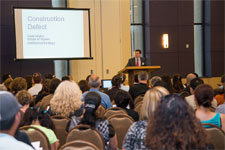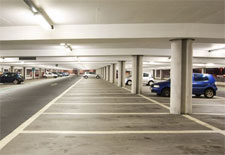 *New Legislation
*New Legislation
Provisions of the Davis-Stirling Common Interest Development Act (Civ. Code §§ 4000 – 6150) currently require homeowners associations (“HOAs”) to “provide a fair, reasonable, and expeditious procedure for resolving a dispute” between a HOA and its members. Civ. Code §§ 5900, 5905. This procedure is commonly referred to as “Meet and Confer” or “Internal Dispute Resolution” (“IDR”). Its purpose is to provide a non-adversarial forum where a HOA member and a HOA Director can meet informally to see if a resolution to the dispute can be secured short of involving attorneys and taking legal action.
However, the passage of AB 1738 (Chau) will upset this non-adversarial and informal structure through providing a member with the right to have the member’s attorney present at the IDR meeting. While this may not seem problematic, HOAs and industry professionals that are familiar with the IDR process understand that AB 1738 will undoubtedly result in HOAs incurring greater attorney’s fees to resolve member disputes. CAI’s California Legislative Action Committee’s (CAI-CLAC) “Call to Action” on AB 1738 illustrated its inherent problems:
“AB 1738 encourages members to bring attorneys and others to their first meeting with a single board member who has volunteered to help work out the member’s problem or concern. These simple ‘meet-and-confer’ conversations over coffee most often resolve an issue. When they occasionally don’t, either party may pursue a more formal Alternative Dispute Resolution (ADR) process that does involve lawyers. Nothing in law prevents lawyers from attending IDR right now, but AB 1738 actually promotes having them present to argue the issue(s). This will invariably make the discussion adversarial…
…If a member brings an attorney [to IDR], the HOA will very likely bring an attorney. At $300 per hour, each IDR will cost HOAs a minimum of $900 when one considers the lawyer’s time preparing, attending and any follow-up actions. [AB 1378] will end up increasing assessments.”
These sentiments were echoed by the Educational Community for Homeowners (ECHO) in its opposition to AB 1738: “By default, associations will bring their attorneys to IDR. In order to protect themselves, owners will also bring their attorneys. This increases the expenses for both parties, and encourages an adversarial atmosphere.”
IDR is not mediation, but an informal meeting between the member and at least one (1) HOA Director. As such, the communications during the IDR meeting are generally not subject to the confidentiality requirements that cover the more formal “Alternative Dispute Resolution” (“ADR”) process. AB 1738 could allow for the communications and documents discussed at IDR to be admissible in future litigation, and thus serve as a significant problem for the HOA. This is one reason why our office, along with the majority of HOA attorneys, are advising our HOA clients engaged in IDR with a member to close and reschedule the IDR meeting if the member unexpectedly brings their attorney to the IDR meeting. If the member is represented by an attorney, the HOA should ensure that it is as well. Rescheduling the IDR meeting so that the HOA’s attorney can also be present is vital to protecting the HOA’s interests.
Despite overwhelming HOA industry opposition to AB 1738, it was signed into law by Governor Brown on September 18, 2014, and will take effect January 1, 2015. To read the text of AB 1738 and how it will amend the current provisions of Civil Code Sections 5910 and 5915, click here.
 |
AB 1738 represents a tremendous setback for HOAs and their members in their efforts to resolve disputes in a quick and cost-effective manner. Where those efforts fail, the parties are free under current law to move to ADR (a form of mediation) in order to involve attorneys and see if a resolution can be secured short of litigation. As a result of AB 1738, HOA Boards of Directors and management professionals must be cognizant of the problems that could arise if a member’s attorney attends the IDR meeting without the HOA’s attorney also being present. HOAs seeking specific guidance and recommendations on this issue should consult their legal counsel.
|

 HOA Lawyer Blog
HOA Lawyer Blog



 Most every set of Homeowners Association (“HOA”) CC&Rs contain a provision prohibiting conduct which constitutes a “nuisance.” That conduct often includes “noxious, illegal or offensive activities,” anything which “unreasonably interferes with a resident’s right to quiet enjoyment” and/or “endangers their health or annoys or disturbs” them. We have blogged about how such nuisance provisions may be employed to resolve issues such as the
Most every set of Homeowners Association (“HOA”) CC&Rs contain a provision prohibiting conduct which constitutes a “nuisance.” That conduct often includes “noxious, illegal or offensive activities,” anything which “unreasonably interferes with a resident’s right to quiet enjoyment” and/or “endangers their health or annoys or disturbs” them. We have blogged about how such nuisance provisions may be employed to resolve issues such as the  *New Legislation
*New Legislation

 The ability of California homeowners associations (“HOAs”) to adopt and enforce restrictions on the renting of units has been limited by
The ability of California homeowners associations (“HOAs”) to adopt and enforce restrictions on the renting of units has been limited by  Our
Our 
 *New Library Article
*New Library Article